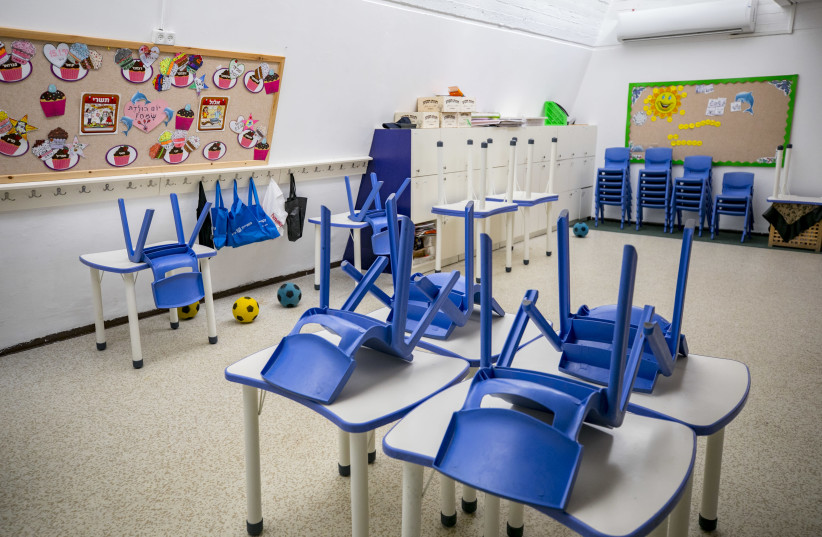As the beginning of the school year approaches, the Finance Ministry is engaged in serious negotiations with the Teachers’ Union regarding the improvement of conditions for workers in the educational sector. The stakes are high, as the union is threatening to launch a strike on the first day of school.
“There will be great chaos,” Teachers’ Union head Yaffa Ben-David said Thursday. “As it currently stands, the school year will not start.” She criticized the Finance Ministry’s attempts to stifle the union’s demands, calling them “a bunch of men who think they will determine what should be.”
“We are the solution, not the problem,” Ben-David said. “The ministry is the problem. We are all educators who want to teach and develop. From this crisis we can only grow… It is not possible to go around, lie and take from the teachers what they deserve. The fight is for the children to have the best teachers, and we need to preserve them.”
Foresight is 20/20 (If you're not a minister)
According to Ran Shai, chairman of the National Student Council, the process of sorting out this issue could have gone smoother had the relevant parties acted sooner.
“We are all educators who want to teach and develop, from this crisis we can only grow … It is not possible to go around, lie and take from the teachers what they deserve."
Yaffa Ben-David
“Negotiations started early,” he said Thursday in an interview with 103FM. “Already in January, the Education Ministry came to the Finance Ministry and the Teachers’ Union and asked to bring a new salary agreement. Since then it seems that we are only being delayed. I don’t think there is [only one] side to this conflict. It may sound a little innocent, but I believe that we need to sit down and solve it in a simple way.”

Shutting down the educational system on the first day of school would be an irresponsible step by the union, Shai said, adding that “school, which is supposed to be the anchor in our lives, is once again threatened with upheaval. Not opening on September 1 [would be] reckless.”
He acknowledged the importance of what the union is asking for, namely, a framework that will allow young teachers to progress in their careers over time.
Shai criticized the Finance Ministry for being overly involved.
“I don’t understand why the Finance Ministry should interfere in the policy of the Education Ministry,” he said. “We don’t want teachers to join and after three years leave because they have nowhere to advance. We need an invested education system.”
The ministry in the middle
On Wednesday, Finance Minister Avigdor Liberman presented what his ministry had offered to the union to resolve the conflict, calling it “generous” and warning against a back-to-school strike.
“I hear that there are those who are sure that a government two months before elections will not be able to afford [dealing with] a strike, and there is an actual attempt here to take the students and parents hostage,” he said. “Violent and thuggish conduct will not pay off.”
The proposed agreement would implement a higher starting salary for teachers (NIS 9,000 for a full-time position), salary increases for administrative staff and school principals, bonuses for teachers who remain in their positions for several years, new minimum-wage regulations for specialty positions and new options for teachers to take vacation days, among several other points.
According to Shai, the opportunity presented by the Finance Ministry’s proposed agreement could make “a profound change in the education system and not just a temporary solution [by strengthening] the status of teachers and administrators within the schools.”
The doctor steps in...
Education Minister Yifat Shasha-Biton has been trying to resolve the issue with the union and Finance Ministry.
On Wednesday night, following a meeting with Prime Minister Yair Lapid and Liberman, she said several relevant authorities were scrambling to come up with a feasible solution to ensure the school year starts on time.
“I will not let the students, parents and education staff be left tension and uncertain,” she said. “We must reach a solution by next week.”
However, after a series of additional meetings on Thursday, Shasha-Biton asked Lapid to convene an emergency Knesset meeting on the issue for next Sunday, August 23.
“Despite my efforts in recent months, and the extensive compromises and agreements I have reached with the Teachers’ Union, I see time and time again that the officials of the Finance Ministry are not interested in reaching a real solution [and] are not interested in reaching agreements,” she said.
“Again and again I find that the Finance Ministry is indifferent to the danger that the school year won’t open, despite my many efforts over the last few months to prevent it,” she added.
“It goes without saying that the proper functioning of the education system, as well as the possibility of a strike at the beginning of the school year, have a wide impact on the entire Israeli economy, and therefore I will ask to convene an emergency discussion of the government this coming Sunday, even during the government recess,” Shasha-Biton said. “We should not allow the students of Israel further uncertainty on the night of the 31st.”
